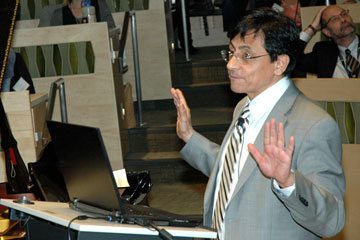
By Chris Casey | University Communications
AURORA, Colo. - The mysteries of the interplay between music and the brain were explored in an entertaining program at the new Fulginiti Pavilion for Bioethics and Humanities on the Anschutz Medical Campus on Wednesday.
The multimedia program was the first in a new series on the brain presented by the newly established Center for NeuroScience. Featured speaker and performer was Professor Hector Rasgado-Flores, of the Chicago Medical School, who discussed "Brain, Music and Sense" in a packed auditorium.
Rasgado-Flores, an accomplished musician and scientific researcher, combined analysis of music and its relation to human history, physiology and mood with performances on a piano in the center of the auditorium.
"The single most important purpose of the brain is to make understandable sense of ourselves and our universe," Rasgado-Flores said.
He showed how the brain, when exposed to different sounds from two speakers, puts the sounds together to hear them in a coherent way. "Your brain wants things to be simple because that's what makes sense -- it's nice," Rasgado-Flores said.
He also explained how music is the most powerful mood modifier known to man. He pointed out that Confucius said that music provides a moral force that's able to generate goodwill and harmony between families and communities. And famed musician George Frideric Handel said music is not a function of entertainment but of making better citizens.
The program included a talk by Dan Tollin, PhD, associate professor, Department of Physiology and Biophysics, and a performance by Mellow Media, the Anschutz Medical Campus orchestra. Introducing the program were Diego Restrepo, PhD, professor of cell and developmental biology and director of the Center for NeuroScience; Richard Johnston, MD, associate dean for research development, School of Medicine; and John Sladek, PhD, professor, Neurology Department.
Sladek told the audience that more programs about interesting aspects of the brain will be presented in the future. He asked the audience to write him or Restrepo with any suggested program topics.
"We want this to be an interactive community forum where we partner with you and where these wonderful experts on campus in all of our departments -- which have these 170-plus neuroscientists -- can offer you ideas," Sladek said.
Johnston said the Center for NeuroScience represents the combination of the science of neuroscience with clinical applications. "You have the coming together of two very, very strong groups to address very, very serious problems."
Tollin gave a presentation of "Can You Hear Me Now? I Can't Remember." He discussed how the brain processes sound and talked about the growing problems of hearing loss and increasing rates of dementia and Alzheimer's Disease in the United States.
"One of the goals of the NeuroScience Center is to bring together very disparate researchers that have been traditionally separated, both ideologically and by bricks and mortar, under one roof to think about how we can solve human health problems, particularly neurological problems," Tollin said.
(Photo: Professor Hector Rasgado-Flores talks about music and the mind during the Center for NeuroScience Brain Series program.)
Contact: christopher.casey@ucdenver.edu




